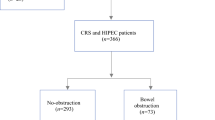Abstract
Purpose
Inoperable malignant bowel obstruction (MBO), a severe complication of peritoneal carcinomatosis, has a low desobstruction rate (30–40 %) and end-of-life decision-making is hampered by the lack of known prognostic factors. This study aimed to explore prognostic factors for desobstruction in MBO.
Methods
All patients with inoperable MBO admitted in our large oncology hospital between 2010 and 2013 were treated following a clinical protocol based on antiemetics, steroids and two antisecretories, octreotide, and hyoscine butylbromide. Two prognostic factor analyses using logistic regressions were performed, one based on data from day 1 of admission and the other on data from day 8.
Results
Forty-five patients were included. Frequency of desobstruction was 48.9 %. In the analysis of prognostic factors on day 1, MBO episodes derived from functional physiopathologic mechanisms (vs. mechanic or mixed) were more prone to resolve (p < 0.001 corrected for multiple comparisons). Considering patients alive with persistent obstruction on day 8, a better clinical condition was the variable more associated with desobstruction, but without statistical significance after correction for multiple comparisons.
Conclusions
A functional physiopathologic mechanism of MBO development may be an early prognostic factor for desobstruction. A high proportion of desobstruction was observed, suggesting that the combination of antisecretories with different mechanism of action warrants further investigation.

Similar content being viewed by others
References
Anthony T, Baron T, Mercadante S, Green S, Chi D, Cunningham J, Herbst A, Smart E, Krouse RS (2007) Report of the clinical protocol committee: development of randomized trials for malignant bowel obstruction. J Pain Symptom Manag 34:S49–S59
Tuca A, Guell E, Martinez-Losada E, Codorniu N (2012) Malignant bowel obstruction in advanced cancer patients: epidemiology, management, and factors influencing spontaneous resolution. Cancer Manag Res 4:159–169
Feuer DJ, Broadley K. (2004) Surgery for the resolution of symptoms in malignant bowel obstruction in advanced gynaecological and gastrointestinal cancer. In: The Cochrane Library. Wiley, Chichester
Mercadante S, Ferrera P, Villari P, Marrazzo A (2004) Aggressive pharmacological treatment for reversing malignant bowel obstruction. J Pain Symptom Manag 28:412–416
Fallon MT (1994) The physiology of somatostatin and its synthetic analogue, octreotide. Eur J Palliat Care 1:20–22
Mercadante S, Ripamonti C, Casuccio A, Zecca E, Groff L (2000) Comparison of octreotide and hyoscine butylbromide in controlling gastrointestinal symptoms due to malignant inoperable bowel obstruction. Support Care Cancer 8:188–191
Peng X, Wang P, Li S, Zhang G, Hu S (2015) Randomized clinical trial comparing octreotide and scopolamine butylbromide in symptom control of patients with inoperable bowel obstruction due to advanced ovarian cancer. World J Surg Oncol 13:50
Ripamonti C, Mercadante S, Groff L, Zecca E, De Conno F, Casuccio A (2000) Role of octreotide, scopolamine butylbromide, and hydration in symptom control of patients with inoperable bowel obstruction and nasogastric tubes: a prospective randomized trial. J Pain Symptom Manag 19:23–34
Mystakidou K, Tsilika E, Kalaidopoulou O, Chondros K, Georgaki S, Papadimitriou L (2002) Comparison of octreotide administration vs. conservative treatment in the management of inoperable bowel obstruction in patients with far advanced cancer: a randomized, double- blind, controlled clinical trial. Anticancer Res 22:1187–1192
Mercadante S, Porzio G (2012) Octreotide for malignant bowel obstruction: twenty years after. Crit Rev Oncol Hematol 83:388–392
De Conno F, Caraceni A, Zecca E, Spoldi E, Ventafridda V (1991) Continuous subcutaneous infusion of hyoscine butylbromide reduces secretions in patients with gastrointestinal obstruction. J Pain Symptom Manag 6:484–486
O’Connor B, Creedon B (2011) Pharmacological treatment of bowel obstruction in cancer patients. Expert Opin Pharmacother 12:2205–2214
Mariani P, Blumberg J, Landau A, Lebrun-Jezekova D, Botton E, Beatrix O, Mayeur D, Herve R, Maisonobe P, Chauvenet L (2012) Symptomatic treatment with lanreotide microparticles in inoperable bowel obstruction resulting from peritoneal carcinomatosis: a randomized, double-blind, placebo-controlled phase III study. J Clin Oncol 30:4337–4343
Mercadante S (1998) Scopolamine butylbromide plus octreotide in unresponsive bowel obstruction. J Pain Symptom Manag 16:278–280
Laval G, Arvieux C, Stefani L, Villard ML, Mestrallet JP, Cardin N (2006) Protocol for the treatment of malignant inoperable bowel obstruction: a prospective study of 80 cases at Grenoble University Hospital Center. J Pain Symptom Manag 31:502–512
Currow DC, Quinn S, Agar M, Fazekas B, Hardy J, McCaffrey N, Eckermann S, Abernethy AP, Clark K (2015) Double-blind, placebo-controlled, randomized trial of octreotide in malignant bowel obstruction. J Pain Symptom Manag 49:814–821
Porzio G, Aielli F, Verna L, Galletti B, Shoja ERG, Ficorella C (2011) Can malignant bowel obstruction in advanced cancer patients be treated at home? Support Care Cancer 19:431–433
Hisanaga T, Shinjo T, Morita T, Nakajima N, Ikenaga M, Tanimizu M, Kizawa Y, Maeno T, Shima Y, Hyodo I (2010) Multicenter prospective study on efficacy and safety of octreotide for inoperable malignant bowel obstruction. Jpn J Clin Oncol 40:739–745
Tuca A, Martinez E, Guell E, Gomez Batiste X (2010) Malignant bowel obstruction. Med Clin (Barc) 135:375–381
Watari H, Hosaka M, Wakui Y, Nomura E, Hareyama H, Tanuma F, Hattori R, Azuma M, Kato H, Takeda N, Ariga S, Sakuragi N (2012) A prospective study on the efficacy of octreotide in the management of malignant bowel obstruction in gynecologic cancer. Int J Gynecol Cancer 22:692–696
Author information
Authors and Affiliations
Corresponding author
Ethics declarations
All procedures were in accordance with the ethical standards of the institutional research committee and with the 1964 Helsinki declaration and its later amendments or comparable ethical standards. For this type of study formal consent is not required.
Conflict of interest
The authors declare no conflicts of interest. No funding was required for this work.
Electronic supplementary material
ESM 1
(DOCX 12 kb)
Rights and permissions
About this article
Cite this article
Romeo, M., de los LLanos Gil, M., Cuadra Urteaga, J.L. et al. Outcome prognostic factors in inoperable malignant bowel obstruction. Support Care Cancer 24, 4577–4586 (2016). https://doi.org/10.1007/s00520-016-3299-7
Received:
Accepted:
Published:
Issue Date:
DOI: https://doi.org/10.1007/s00520-016-3299-7




